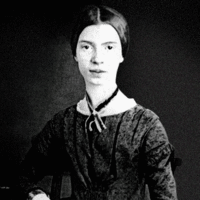59 a little East of Jordan (145)
by Sophia Brookshire
Emily Dickinson's poem "145 (59)" is based on the biblical story Genesis 32. It is unclear why she chose this particular verse to immortalize; this could have been her favorite verse in the Holy Bible, or it could be that she could just relate to the story, or any other number of reasons. The story goes as follows: Jacob sent messengers to his brother Esau to tell him that all he wanted was to see him; he also sent along gifts as a way to placate his brother (Jacob and Esau had not seen each other in a long time, because Jacob cheated his older brother out of his rightful inheritance). Jacob's messengers returned and informed him that Esau wished to see him also, and that Esau was accompanied by 400 men. This greatly distressed Jacob, because he thought his brother had come to kill him. Jacob decided to divide his entourage into two groups, so that if his brother came to kill him during the night only half of his men would die and others could escape before harm befell them. Jacob asked God for his mercy. Jacob separated himself from his men, and went off to sleep alone in Jabbok. He ended up wrestling all night with a man he did not know. At day break the unknown man asked to take a break, but Jacob would not let him take a break unless the man blessed him. The unknown man asked for Jacob's name, and Jacob told him. The unknown man said that Jacob was no longer to be his name from now on he was to be called Israel. Jacob asked the unknown man what his name was, and discovered that the man he had been wrestling all night was God. Jacob changed the name of that place to Peniel, which means 'the face of God.'
Dickinson's story differs slightly, but the main premise of the story remains. The first stanza is filled with darkness and fear. "A little East of Jordan" refers to the area known as Jabbok. "Evangelists" are the writers (recorders) of the four Gospels in the New Testament. The gymnast is supposed to be Jacob, and the angel is supposed to be God; this is the first difference. The gymnast and the angel wrestled for a long time and were very tired. The second stanza opens with a shift from darkness to light. It is morning, and the sun's light touches the top of the mountain where the two are wrestling. Dickinson seems to forget her metaphor for a minute and refers to the gymnast as Jacob, but quickly regains herself in the next line. "Waxing" is slang for to defeat decisively. Jacob was winning the match, and the angel knew it so he begged for permission to "breakfast" and then return to the match; the word "breakfast" is not used in the biblical story, but it is implied. In the third stanza, the "cunning" (skillful) Jacob tells the angel that he will not stop unless the angel blesses him. The "stranger" accepted Jacob's terms. In stanza four, God reveals himself and Jacob is stunned to find that he had "worsted" (defeated) God. Jabbok became known as the Peniel Hills from then on. "Silver fleeces" were not mentioned in the biblical verse.

